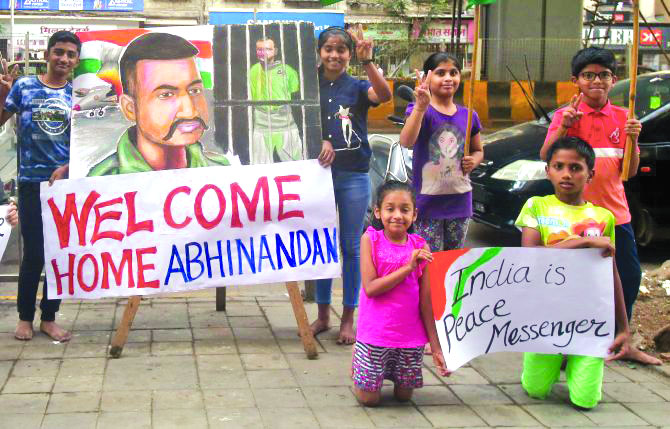As our hero pilot is back and UAE and Saudi Arabia are helping defuse tension, India must take the diplomatic way
With Wing Commander Abhinandan Varthaman back home after Pakistan, under tremendous international pressure, released him from captivity, let’s remember what he stood for. First, his extreme courage under fire. He chased back a fleet of hostile Pakistani jets when they crossed the LoC and shot down a latest Pakistani F-16 with a vintage MiG-21. Second, his extreme alertness and presence of mind. Brought down by the Pakistani side, he followed his survival drill to a T, swallowing papers, junking other evidence in a pond, shooting at locals in self-defence before he was overpowered and roundly thrashed. Third, grace under pressure. As a true soldier, he held his own, revealing only his name and number and skillfully dodging mindgames by his captors.
In short, his poise and dignity remind us how hereon we should pursue a path of equanimity. True, we have just about started a new fight against terror, and the deep strike into Pakistan to smash a Jaish base does not mean that our problems are over. In fact, they may have just begun, requiring us to be ever ready along the LoC. By attempting a “non-military, pre-emptive” strike on terrorist bases that plan bombings in India, we have opened a new path of staying way below the nuclear threshold and yet protect our national security. And with terrorists gone from the frontline, Pakistan will find new ways of provoking India. So with this paradigm shift, we have to be on the ball and extremely vigilant about a Pakistani offensive. We could do so without brashness and bluster, instead consolidate our diplomatic offensive and build on the gains made so far. In fact, it is the diplomatic isolation of Pakistan globally on the anti-terrorism plank that helped us get back Abhinandan in record time, considering the history of Indian PoWs in Pakistani captivity.
India should now continue to press its point home and reverse opinions. This is borne out by the fact that the Organisation of Islamic Countries (OIC) named us a chief guest and did not withdraw that status despite the airstrikes. This miffed Pakistan so much that it decided to stay away from its ongoing edition. Minister for External Affairs Sushma Swaraj, in her speech at OIC, highlighted that the fight against terrorism was not a confrontation against any religion. She even gave a conscience call to “tell the states who provide shelter and funding to terrorists, to dismantle the infrastructure of the terrorist camps.” An indirect reference to Pakistan. This space was unthinkable even last year when the OIC was uncomfortable about Army presence in Kashmir and easily fed on Pakistani propaganda. But countries like Bangladesh have been arguing for expanding the scope of OIC so that India could get observer status. India itself has been citing its Muslim population base as a marker of eligibility. A bigger coup is getting the support of Saudi Arabia and the UAE. While the West, led by the US, worked the lines with Pakistan to defuse tension along the LoC, it is the Saudis who played a crucial role in convincing Pakistan to simmer down and release Abhinandan. Although Saudi Arabia is a close ally of Pakistan and has its imperatives, it still sees India as a key market and acknowledges the contribution of our workforce to it. Saudi Arabia’s Crown Prince even rushed a minister to Islamabad with a key message. The UAE has emerged an ally, too, its Crown Prince stressing the “importance of dealing wisely with recent developments and giving priority to dialogue and communication.” And though China considers Pakistan an all-weather friend, even it did not want to risk India’s goodwill for fear of losing a stable trading partner given the US rebuff on that front. Its commonalities with us are bigger than differences. China’s Foreign Minister Wang Yi firmly told Pakistan that China “does not want to see acts that violate the norms of international relations.” If India spearheads the fight on terror in the region diplomatically and works for a consensus approach, it will give us bigger gains.
Courtesy & Writer: Pioneer








 OpinionExpress.In
OpinionExpress.In















Comments (0)